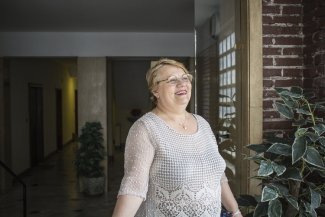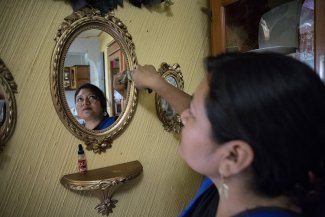Colombian migrant Clara Hoyos has been living in the Spanish city off Valencia for three years. During this time, she has earned a living as a domestic worker, taking care of cooking, cleaning, caring for people and even animals.
Three years ago, Colombian Ángela López landed in Madrid with the intention of passing herself off as a tourist. She had memorised the city’s most famous landmarks, but when the immigration officer asked her what her travel plans were, Ángela’s mind went completely blank. She was feeling sick with the stress of it all. “As soon as I set foot in Spain, I thought, ‘What am I doing here,’” she recalls. She was fleeing an abusive relationship, she was leaving two children behind in Colombia and she was faced with a fate that had already been written. “I wanted a live-in job, because that’s what you’re told is the best thing to do when you arrive because, that way, you save on food and housing.”
An estimated 600,000 women work in the domestic sector, and only 400,000 pay social security contributions. The rest eke out a living in a job market with no rules and where undocumented single mothers from Latin America abound.
They travel to Spain as tourists and extend their stay beyond the legal three months. Without a work permit and urgently in need of a steady income to be able to send money to their children, they take on informal employment in private households, where migrants and Spanish families support each other behind the state’s back. It is migrant women like these who shoulder a large part of the burden of care.
In the shadows, but essential
Although the commitment to care for dependent persons is written in law in Spain, its care system has clear limitations, and many households are forced – or choose – to hire cheap labour, which has led to a resurgence of the sector. In the mid-20th century, domestic service was a sign of status, but in the 1990s it re-emerged as a necessity, with the entry of more women into the labour market, population ageing and the feminisation of migration flows. Migrant women began taking on the household responsibilities of Spanish women. Men were still not part of the picture.
“We’re using domestic workers as a sticking plaster because the state is not addressing the care issue,” says lawyer Arantxa Zaguirre, who works with Territorio Doméstico, an association of domestic workers. “The fact that domestic work and care work are not separated is problematic. This comes from a type of employment relationship that was not even considered to be one: 40 years ago, women from the towns and villages did the cleaning and the ironing, and if there were children or grandparents to take care of, they did that too. So when the law [on domestic service] was drafted in 1985, they were treated as the women of the house and everything that goes on inside it. But care is not the same as ironing. The state has to ensure care for dependent persons, not to take care of your ironing.”
In the absence of this dividing line, domestic workers are faced with a barrage of tasks, which they most often accept, disarmed as they very often are by the legislation on foreign nationals that obliges them to wait three years before they can regularise their status. During that time, they live and work in the shadows, unable to sign an employment contract.
“When they find work in a house, they accept any kind of conditions, in the hope that they will be regularised after three years,” says Zaguirre. “And when they get their papers, they need a contract so as not to lose their work permit.”
Ángela is walking this tightrope. As a live-in employee, she has had to work every day, with no end to the day, for €750 a month. For six months she was cleaning, cooking, showering and administering pills to an elderly couple, whom she cared for even in the early hours of the morning, when they wanted to change their position but could not move on their own. “The daughters wanted to lower my salary, so I went to another house, which ended up being even worse: I had to ask permission to go to the bathroom,” says Ángela, who has just returned from her employers’ holiday home. “Now I take care of another couple, who took me to their house where they spend the summer. I’ve been locked up for two months. I even had to clean their swimming pool.”
Clara Hoyos, who is also Colombian, has suffered similar experiences and, as is seemingly often the case, found herself having to care for two people after being hired to care for one. “I was only supposed to look after the grandfather, but his wife became very ill and I had to look after her too. I had no life. I worked for seven months for €850 [per month], until they passed away. I even had to give the grandfather morphine injections. I was alone with him when he died,” she recalls. “Do you know what a trauma that is?”
Their stories unfold out of sight, in the shadow economy, far from the labour inspectorate, in a world where everything works by word of mouth and cross-recommendations between colleagues and where finding an honest employer is a question of luck. And not everyone is lucky. “We often find employers take advantage of the women’s vulnerability and have absolutely no interest in hearing about their rights,” says Marcela Bahamón, spokesperson for the AIPHYC (Intercultural Association of Home and Care Workers). “People tend to think that these workers have no labour rights because their papers are not in order. This is a widespread misconception.”
Local and international, covering all fronts
Associations such as Territorio Doméstico or the AIPHYC have for years been fighting for the ratification of ILO Convention 189, an international agreement adopted in 2011 to regulate domestic employment. Eleven years later, Spain has finally ratified the convention and has passed a Royal Decree-Law that recognises the right to unemployment benefits for domestic workers – it was the only sector without it, which the EU justice system deemed to be discriminatory. The legislation equalises domestic workers’ rights with those of other workers and resolves one of the grievances of this group: dismissal without cause.
The new legislation does not, however, reach all domestic employees. Undocumented migrants continue to be left out. For them, there is no major change, apart from a reform of the law regarding foreign nationals that relaxes the requirements in terms of the social roots migrants have established in the country and introduces the figure of the ‘confidant’ – by accrediting six months of undocumented work they can obtain residence and work permits. Rafaela Pimentel, spokesperson for Territorio Doméstico and leader of domestic and care workers’ union Sintrahocu, is calling for the measures to go further, such as the “extraordinary regularisation of all those already here, because they are also essential. We migrants are keeping the ship afloat and the day there are not enough hands on deck it will sink”.
She may be right. But if this essential work is being assumed by migrants, why are legal migration channels not being opened up? Marcela Bahamón argues that these women are not regularised “because the welfare state is being propped up by people in poverty”. Zaguirre agrees with her and adds:
“What the state does is to open the tap at the airport, letting in tourists that they know will become undocumented workers, a cheap and fearful labour force that guarantees a degree of social control.”
The Comisiones Obreras union agrees on the need to include migrants and is calling on the government to make further efforts. “The Royal Decree is courageous, but some fundamental issues are still pending,” says Pilar Expósito, women’s secretary with CCOO del Hábitat, which represents a broad section of workers in the construction and service industries. “We need, for example, to regulate the right to collective bargaining, to promote trade union representation and give greater visibility to the professionalisation of the sector.” She ends by adding her voice to one of the demands of the associations interviewed: to integrate the sector into the general social security system in order to achieve full equality with other workers.
Two of Spain’s national centres, CCOO and UGT, have been crucial in lobbying for Spain to ratify conventions such as C189 and C190 – against violence and harassment at work. “Signing them means saying that domestic work also deserves international recognition,” says Ana María Corral, head of the UGT’s migration section, “and in a way they advance the rights of all women workers”. But the trade unionist also calls for the Royal Decree to be extended: “We are lacking a system that makes the labour inspectorate effective and, for example, enables undocumented workers to report abusive labour practices.”
In short, the social partners want a broader and wider legal framework that covers all workers, including those who come without the required papers. With this aim in mind, they are calling for a change of attitude, a mindset that values care for dependent persons, which is essential in a society characterised by increasing life expectancy and a decline in welfare policies. Identifying this urgent need means moving towards a public care system that does not skimp on budgets and that integrates the professionals working in the shadows. Otherwise, women like Ángela López and Clara Hoyos will continue to be objectified as an emergency resource for families in need. Precarious labour. Essential for maintaining the social order.













